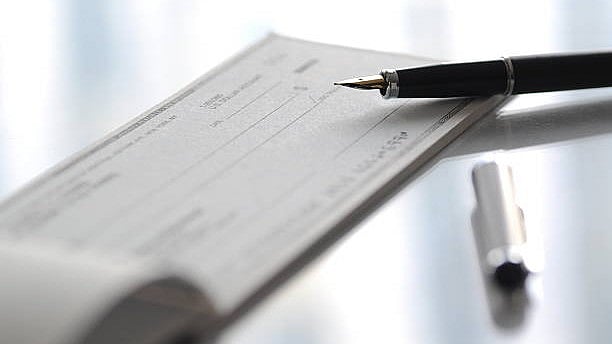
Representative image of a cheque.
Credit: iStock Photo
New Delhi: The Supreme Court has said absence of cheque, bank transfer or receipt won't always negate cash transaction.
The top court said it is not uncommon that in money transactions, there is a component of cash also involved.
"Just because a person is not able to prove the transfer through official modes i.e., through any negotiable instrument or bank transaction, it would not lead to the conclusion that such amount was not paid through cash, especially when there was a categorical statement to this effect," a bench of Justices Ahsanuddin Amanullah and Vipul M Pancholi said.
The court also stressed, a person who gives cash obviously would not be having any documentary proof per se.
"Sometimes there may be an occasion where even for a cash transaction, a receipt is taken, but absence of the same would not negate and disprove the stand that the cash transaction also took place between the parties,'' the bench said.
The court here allowed an appeal filed by Georegekutty Chacko, who contended that though his suit for recovery of an amount pursuant to a promissory note has been upheld but the amount to be recovered, i e, Rs 35,29,680 has been reduced to Rs 22,00,000 only by the High Court.
In the present case, the court held the bifurcation made by the High Court is clearly erroneous and therefore, unsustainable.
The appellant submitted that the obligation to pay the amount by the respondent, M N Saji was pursuant to a promissory note in which clearly the respondent had accepted that he had received Rs 30,80,000 from him.
The appellant filed the suit for recovery of the amount, which was allowed by the Trial Court.
The Trial Court decreed the suit for Rs 35,29,680. However, the High Court modified the order and reduced the decretal amount to Rs 22,00,000.
The appellant's counsel submitted that once the promissory note has been accepted by both the courts and also by the respondent, the amount clearly specified in such promissory note could not have been unilaterally reduced.
He contended the course taken by the High Court with regard to there being proof of only Rs 22,00,000 having been paid by the appellant to the respondent is erroneous for the reason that the clear cut stand was that Rs 22,00,000 was given through various instruments/bank transactions whereas the remaining was given by cash.
The appellant also submitted to reject the cash amount, that too, only on the ground that it was an oral statement, is not correct, for the reason that the document i.e., the promissory note, as a whole has to be taken, especially when there was no complaint by the respondent that the promissory note, though signed by him, contained incorrect fact and/or there was any manipulation.
"Having considered the matter and going through the material on record, we find that a case for interference has been made out,'' the bench said.
The court pointed out when the appellant has taken a specific stand that he has paid Rs 30,80,000 to the respondent pursuant to a promissory note, which incidentally has been upheld and not disbelieved, the onus would be on the respondent to dispel such fact.
It also noted there was a categorical statement by the appellant before the court concerned.
The bench also found, moreover, the initial presumption of legally enforceable debt comes from the Negotiable Instruments Act also and thus the onus is on the respondent to prove that no such amount was given.
"Only because documentary proof was not available, we find such a view taken to be erroneous,'' the bench said, setting aside the High Court's order.
